- Home
- Diane Fanning
Treason in the Secret City Page 3
Treason in the Secret City Read online
Page 3
‘No, I don’t either. So, where?’
‘It’ll have to be out in the woods. Every day, just before the sun comes up, Frannie sneaks out into the woods. There’s a dilapidated shed out there where she hides out for the day. Hannah gave us a potato chip tin from the kitchen to keep crackers and apples and bread safe from animals overnight so Frannie has something to eat during the day. Then, after it grows dark, she goes back to Hannah’s place to sleep and get her only hot meal of the day. I’m supposed to meet her there after work tomorrow. I guess that’s today now. Could you come with me?’
‘If I can get away, I will try, Marvin. Find me or send word to me when you’re ready to leave.’
‘Probably won’t be till late since most days I put in ten or twelve hours right now. But Frannie won’t leave the shed and go to the hutments until after I get there.’
‘OK, go home, Marvin. Try to get some sleep. We’ll both need it to get through the coming day.’
That advice was easier to give than to follow. The idea of another hostile encounter with the military and the administration made me feel uncomfortable, anxious and a little frightened. What if Marvin was wrong about his cousin? If I talked to Frannie Snowden and didn’t believe her, what would that do to Marvin? How would he handle it? Would he try to push the issue with the Walking Molecules without my support? Would the cohesiveness of the group crumble under the assault of the inevitable conflict between me and Marvin?
I calmed down enough to take my mind off of the Marvin/Frannie worries, but as soon as I started to slide into slumber, my eyes popped open and the bigger worry intruded. Spies here? That was obviously true. Whether Frannie was telling the truth or simply trying to hide her guilt by pointing at someone else, there was at least one spy here – maybe more.
Could I have talked to that person? Laughed with him? Danced with him? Often the biggest evils were hidden behind a facade of commonplace banality. Traitors, monsters and criminals didn’t come with identification tags.
Was Frannie really the Dumb Dora, Marvin thinks she is? Or was that just a mask she wore to conceal a devious, deceptive mind? And when I met her – when I talked to her – would I be able to tell the difference? I know my Aunt Dorothy could do that but I didn’t know if I’d absorbed enough instinct from my perceptive, intuitive relative to make a sound judgment on my own.
FOUR
The strange night had worn me out. I didn’t feel the least bit rested as I trudged to work that morning. I could have caught the bus but didn’t want to wait for it. So, of course, the bus passed me on the way and got there long before I did. Usually, I liked the long walk because it gave me time to think and transition into lab mode, but this morning, I wasted the time fretting about Frannie and spies. As Y-12 came into sight, I struggled to inject optimism into my thoughts. If I didn’t put on a good front, I’d drag others down with me.
In January, they’d all celebrated the resolution of the problem of oil contamination and arcing in the coils only to face another series of problems that at times seemed insurmountable. Now at the end of May, four Calutrons were running and producing enriched uranium. I stopped myself in my tracks – I couldn’t ever say that word out loud so better not even think it. Enriched tube alloy.
General Groves said he needed them to produce one kilogram of ninety percent pure tube alloy each month. Sadly, by the end of February, we only had 200 grams – a lousy forty teaspoons full of the pretty teal crystals and its purity was at a lowly twelve percent. It seemed like a waste of the gold that lined the small nickel shipping container. Not exactly awe-inspiring. I prepared it for shipment anyway, delivering down to the bunker with an armed guard by my side. Wherever it would go from there, I didn’t know. But I was well aware that the scientists on the other end were screaming for some amount of product – any amount – to use in pursuit of the gadget. Although I was working behind the scenes with some of the top scientists in the nation, I used a language foreign to the scientific nomenclature I had grown accustomed to at the universities. Product. Gadget. It was as dumb-sounding as the name of my little merry band of scientists, the Walking Molecules. At least, the guys had an excuse; they had been tipsy when they named it.
We had all worked long hours in the lab and on the floor to modify the Calutron that became functional in January and bring the new ones into production and improve their efficiency. The last sample product I ran through the spectrometer generated excellent results. I didn’t really trust it, though – it seemed too good to be true. After weighing, analyzing and extrapolating, the result was sixty percent. I hoped it was right and it was sufficient progress to delay any plans G.G. might have to pay a visit and personally address the issue of the lagging quality and quantity. I knew if he came, he’d seek me out for answers and solutions. Unfortunately, I had no confidence that the ninety percent product he wanted was even possible to achieve.
The sense of urgency infected me today as it did every day when I entered the building after flashing my badge at the guard. I didn’t dawdle but went straight to my lab station and plunged into my work. I was too intently focused to notice anyone else’s arrival but when I came up for air, I sensed that something didn’t seem right. A solemnness hung in the air like an oppressive storm cloud. The scientists all looked listless. Where was the usual hustle and bustle? Had something catastrophic occurred while I wasn’t paying attention, did the race tracks fail again?
‘OK,’ I said in a raised voice, ‘what did I miss? Do we have another Calutron problem?’
‘No,’ Gregg said with a sigh. ‘The equipment’s fine.’
‘Then why all the sad sacks?’
Tom said, ‘It all seems so futile.’
‘Winning the war seems futile to you?’
‘No, thinking we can do anything that would lead to that outcome. We’re just sitting here trying to improve our production for a purpose we’re not allowed to know and the only thing we do know is that we’re obviously failing miserably.’
‘Failing? Why do you say that?’ I said, biting my tongue to keep from blurting out the news of the vastly improved quality and quantity, because I knew Tom was not considered to have a ‘need to know’ for that information. I’d come to hate that phrase.
‘We’re working long hours and everyone keeps telling us to pick up the pace, work harder, make more. No matter how hard we try, it’s never enough. Give me one good reason we shouldn’t all just give up.’
‘Because we need to keep pushing ourselves to do our best day after day, because if we don’t, the Germans will clearly surpass us. We don’t really know what the end result of their endeavors will be, either, but I, for one, don’t want to find out.’
‘Sometimes, I hate this place. It’s already taken the life of one little girl here. How many more have to die before we realize we are wasting our time?’ Tom snapped back.
‘Tom, don’t tell me you’re still agitated about little Virginia Elam? Aren’t you over-reacting?’ I asked. ‘That little girl was killed in a traffic mishap. Accidents happen everywhere. Children die needlessly – sure it’s sad, but we don’t have a monopoly on tragedy here in Oak Ridge.’
‘No, we don’t. But we do have a monopoly on secrets, that’s why what’s happening here makes it so much worse. Somewhere that little girl has grandparents – people who love her. Were her parents allowed to tell their family she was gone? Did they make Virginia’s parents lie to their own parents to cover up her death? Or will they just forbid them from communicating with family outside of the fence? If they disobey, will they be locked up until after the war? The army doesn’t ask questions, they just make assumptions.
‘And the underground network of informers – the creeps – seem to be everywhere. I think some of them are just people like us who’ve been convinced it’s right to spy on their neighbors, but I think there are others who are pretending to be just regular folks but who are really working for the FBI or some agency like that. It’s not just that we have to keep
government secrets, we have to keep our own lives secret from everyone out there who cares about us.
‘Did you know if you died, no one would send your Aunt Dorothy a death certificate explaining why? I’m not even sure they’d let her know you’re deceased. Maybe, she’d just stop hearing from you. Poof! You’re gone. If she inquired, she’d probably be investigated. She won’t know until after the war. If that ever ends – and the pace we’re keeping here sure isn’t going to do it.’
That kind of attitude was exactly what worried me; we couldn’t allow it take root and grow into apathy. We all had to keep working hard and with determination. ‘Tom, we’ve faced problems before and solved some of them. Things aren’t perfect but everything is constantly improving. We can lick these problems if we keep our focus.’ I walked over to Gregg’s station and motioned Tom to follow. ‘Listen, guys, maybe all of our crazy little group should share family contact information so if something happens to one of us, we can get the word out. I know it would be a risk but it’s one I’m willing to take.’
‘It’s worth some discussion, Libby. Why don’t you bring it up in the next meeting? I don’t think Tom will have an objection, will you, Tom?’ Gregg said, teasing him about his notorious reputation for fighting against every new idea anyone ever presented in the group.
‘Funny, Gregg,’ Tom sneered. ‘No, I won’t object. And Libby should be the one to bring it up – family concerns are women’s business, aren’t they?’
I rolled my eyes. ‘Fine. Let’s get back to work. We’ve got a war to win and we’re not going to do that standing around and grumbling like a bunch of gouty old men.’
Tom opened his mouth to snap off a reply, but Gregg’s laugh at my comeback stopped him. I was smiling as I returned to my station. One day, someone will get through to that Neanderthal.
FIVE
I got word from Marvin just before seven that evening that he was leaving in five minutes. After the previous night’s interrupted sleep, there wasn’t much of me left to do anything for anyone. All I really wanted to do was go home, play with my kitten and go to bed. I’d love to wriggle out of my commitment to meet Frannie that night, but the situation was volatile and procrastination could be fatal. I wrapped up what I was doing as quickly as I could and joined Marvin out on the boardwalk ten minutes past the hour.
As we walked through town, I heard Marvin nattering about his cousin’s good character but I wasn’t paying much attention to anything he said. I worried, again, about my ability to tell the truth from a lie, to ask the right questions, to pick up on any telling verbal clues or facial expressions. I probably was most concerned that Marvin was right and Frannie was nothing more than a pawn in a sinister game. The security of the project did not have to override the needs of the individual, but often it did. Innocence could become irrelevant once you got caught in the jaws of the security bureaucracy.
Stepping off the beaten track, Marvin turned to me and put a finger to his lips. ‘Ssssh,’ he said as if I were the one talking non-stop. Entering the wooded area, we followed a barely visible animal trail. I doubt I could have ever found the shack without Marvin leading the way. It sat in what was once a clearing, but now it was filled with scrubby brush and young trees, one of them so close to the rickety wooden structure that it looked as though another two seasons of growth might force the little building to lean over to one side or maybe collapse all together.
‘Wait here,’ Marvin said. ‘I need to let Frannie know about you before she sees you, gets scared and maybe runs off.’
I listened to the quiet murmur of voices while I swatted at pesky mosquitos trying to dine on my arms and legs. Finally, the door of the shack, missing the bottom hinge, scraped and wobbled back open. Marvin stuck his head out and waved me inside.
It took a moment for my eyes to adjust to the gloomy light in the dark cabin. When they did, I spotted Frannie standing near a corner, her brow furrowed like a fresh plowed field, her teeth nibbling on her fingernails. Frannie’s curly brown hair was poking in every direction and her skirt and blouse were soiled and disheveled with little bits of dried leaves sticking to nearly every inch from her head to her toes. For an awkward moment, none of us said anything.
Marvin spoke first. ‘Why don’t we all have a seat?’ he said as he scooted the potato chip can and two apple crates into a triangle.
I sat on the nearest box, eager to get off my feet. Marvin was next and then Frannie approached the remaining can with obvious trepidation and eased her way down, appearing as tense as a performer with severe stage fright. Watching her, I still wondered if it was all one big act.
‘Frannie,’ I said, ‘Marvin told me your story but I’d like to hear it in your own words.’
‘Yes, Frannie,’ Marvin said. ‘I told her about Hansrote approaching you and—’
‘Please, Marvin,’ I interrupted, raising a hand. ‘I really want to hear it from Frannie.’
Frannie looked at me with pursed, quivering lips and then turned her gaze to her cousin. Marvin nodded. Frannie exhaled a huge sigh.
As I listened to her retell the story, I paid attention to all the details to make sure everything lined up with what I had heard from Marvin in the early-morning hours. I didn’t take my gaze off her face as I searched for any little sign of duplicity. I saw nothing to cast doubt on her honesty. She made eye contact with me, but didn’t hold it for overlong, she looked up and away as she recalled the events she shared.
When Frannie finished her tale, she asked, ‘Can you help me?’
Still, I hesitated to make a commitment. How did I know it wasn’t one big, clever lie? Then I saw the tears welling in Frannie’s eyes – a frightened young woman or a good actress? It was so hard to tell. ‘What do you do in your spare time, Frannie?’ I asked, hoping an unconnected, seemingly harmless question might catch her off-guard if she was prevaricating.
‘I like to go dancing and shopping and to the movies,’ Frannie said with a sniff.
‘I mean, now. What do you do while you’re passing the time out here?’
‘I try not to get scared.’
‘You don’t have anything to read?’
Frannie jumped up off the chip can and dug around inside of it, pulling out a raggedy copy of Photoplay. ‘I have this,’ she said with a lopsided grin. ‘I’ve read it cover to cover a few times. I sure hope you can fix things up for me so that I can get back in time to see the new Cary Grant movie,’ she said opening to a page with his picture on it. ‘I haven’t seen him since Bringing Up Baby came out before the war. And he’s just so dreamy,’ she added as she pulled the tattered magazine tight to her chest, a gesture that had Dumb Dora written all over it.
When I asked Frannie if she would like a book to read, Frannie crinkled her nose and shook her head. ‘I don’t read books – not since I got out of school. But I sure would like the new issue of Photoplay or maybe True Confessions.’
Oh dear, she probably was as vapid as Marvin insisted. The possibility that she was indeed a duped innocent shifted to the top of the list. I tried not to allow my instinctive distaste for her choice of reading material to show on my face and said, ‘I’ll see if I can pick them up for you before I come out to see you again.’
‘When?’ Frannie said.
‘I don’t know right now. I just know I certainly will need to ask you some questions after we start digging into this.’
‘You’re going to help Frannie?’ Marvin interjected. ‘Will you present it to the Wal—?’
‘Don’t name it, Marvin, please,’ I interrupted him quickly.
‘What?’ Frannie asked.
‘The less you know about who we are, the safer we all will be, Frannie. I’m sorry, but right now, you do not have a need to know,’ I said, cringing at my own words.
‘But you believe her, right? And you’ll help her, right?’ Marvin begged.
I paused for a moment. The two of them were very convincing and the Marvin I knew didn’t have a dishonest or devious bone
in his body. ‘Yes, I will, unless and until I learn something that changes the equation. If the group disagrees and don’t want to take it on and it’s only you and I, I won’t give up without solid answers. It may be harder for the two of us alone but we can do it if necessary. We can’t allow Hansrote to frame Frannie and continue his undercover treachery undetected.’
SIX
The next morning, I pulled a small sample from the latest batch of green salt and ran the test again. Much to my surprise, the end result indicated that we’d reached a sixty-five percent concentration of the desired product. I found it hard to believe so I did the mathematical calculations one more time. At the current speed of production, I’d have another 200 grams ready to go – I might even be able to send two shipments in June. The progress was exhilarating yet I knew that G.G. would not be satisfied. We were still far away from his goal in both quantity and quality.
However, I could not answer the question of whether or not G.G.’s ninety percent purity demand was an essential one because I did not have any data on the latest research by Fermi, Oppenheimer and all the other scientists at the forefront. Was it their conclusion that it was a critical level needed to initiate the chain reaction that would make a war-ending weapon of destruction? Or was the figure just an approximation by the military brass? Worst of all was that it was a question I was not comfortable asking in a straightforward fashion because I’m not even supposed to be thinking about the ultimate ‘function of the gadget’.
The need for a compartmentalized security structure was frustrating but G.G.’s rule was clear: ‘Each man should know everything he needed to do his job and nothing else.’ That thinking seemed to be in step with military structure but definitely defied the basic character and values of most scientists – sharing of ideas and solutions was an integral part of our world. When it was stifled, the science – and the scientists’ morale – suffered. How do we combat that and maintain a productive environment?

 Death on the River
Death on the River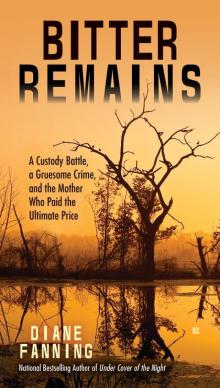 Bitter Remains
Bitter Remains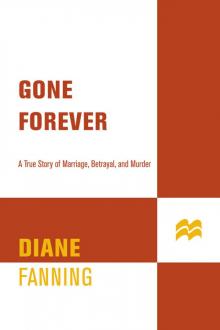 Gone Forever
Gone Forever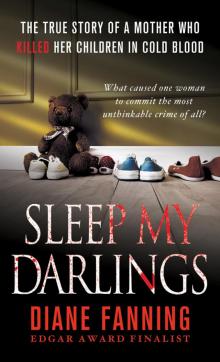 Sleep My Darlings
Sleep My Darlings A Poisoned Passion
A Poisoned Passion Through the Window: The Terrifying True Story of Cross-Country Killer Tommy Lynn Sells (St. Martin's True Crime Library)
Through the Window: The Terrifying True Story of Cross-Country Killer Tommy Lynn Sells (St. Martin's True Crime Library) Chain Reaction
Chain Reaction Baby Be Mine
Baby Be Mine The Pastor's Wife
The Pastor's Wife False Front (Lucinda Pierce)
False Front (Lucinda Pierce)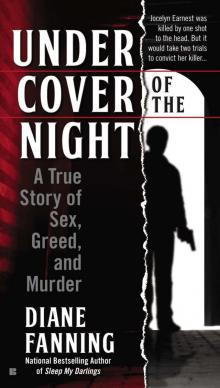 Under Cover of the Night
Under Cover of the Night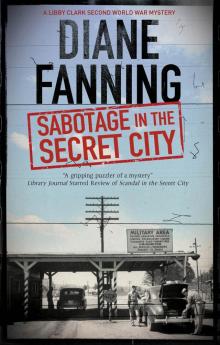 Sabotage in the Secret City
Sabotage in the Secret City Written in Blood
Written in Blood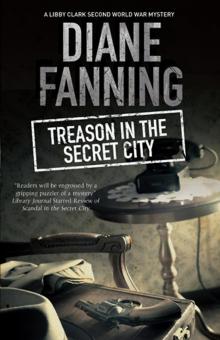 Treason in the Secret City
Treason in the Secret City Wrong Turn
Wrong Turn Under the Knife
Under the Knife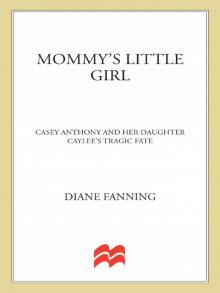 Mommy's Little Girl
Mommy's Little Girl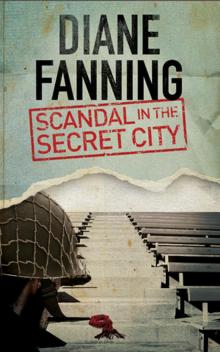 Scandal in the Secret City
Scandal in the Secret City